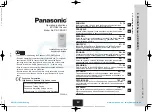
VOT 2; Rev 1.2; EN; 09.07.2013
TKT67C
– Installation and maintenance
13
4.8 Central module panel
LED
Description
Reason for problem and solution
1 MAINS
OPERATION
The central battery unit is using
mains current.
The central battery unit can be
switched into emergency mode also
remotely, if the remote control
feature has been activated. In this
case:
Mains operation
is flashing
Battery operation
is lit
If
Mains operation
led is not lit, main fuse can be
blown or mains voltage is not present.
2 BATTERY
OPER.
The central battery unit is using
battery power. This means that the
mains voltage is interrupted or it has
dropped below 180 V.
The central battery unit can be in
battery operation because external
control has switched it to emergency
mode.
The central battery unit is in
luminaire or battery test.
Indicates if power is coming from battery.
Once the mains voltage recovers or increases
above 195 V, the central battery unit switches back
to mains voltage use and begins to charge the
batteries.
The battery is automatically recharged after the
mains voltage recovers.
3 BATTERY
OVERVOLT.
The battery voltage has increased
above 255 V (N = 278 V) in a normal
situation.
Battery fault
and
Internal fault
LEDs
are also lit.
Battery charger is charging batteries with too high
voltage. Charger is faulty and it must be changed.
and/or
Batteries are at the end of their lifetime and must
be changed.
4 BATTERY
UNDERVOLT.
The battery voltage has dropped
below 228 V (N = 244 V) in a normal
situation.
Battery fault
and
Internal fault
LEDs
are also lit.
The central battery unit has been for a long time in
battery operation.
Battery charger or batteries can be faulty and must
be changed.
Check battery condition. Every cell must have
about the same voltage level. Otherwise some
battery cell is in short circuit.
Check that temperature sensor is connected
properly and it is working. Resistance should be
about 2 kOhm. Voltage over sensor should be
about 5 Vdc.
5 DEEP
DISCHARGE
When this LED flashes, the battery
voltage has dropped below 195 V (N
= 210 V) (an early warning for a
deep discharge).
Internal fault
LEDs are also lit.
When this LED is lit, the battery
voltage has dropped to the deep
discharge limit (173 V).
Battery operation
and
Internal fault
LEDs are also lit.
Check that remote control link is closed (CON5
pins 62 and 63).
Check that mains voltage is coming to Central
Battery Unit.
The
Deep discharge
LED stays lit until it is reset
with the
Reset / Test
button.
The mains voltage must have returned before the
deep discharge alarm can be reset.
Summary of Contents for TKT6716C
Page 26: ...VOT 2 Rev 1 2 EN 09 07 2013 TKT67C Installation and maintenance 26 5 2 1 Parts layout...
Page 42: ...VOT 2 Rev 1 2 EN 09 07 2013 TKT67C Installation and maintenance 42...
Page 43: ...VOT 2 Rev 1 2 EN 09 07 2013 TKT67C Installation and maintenance 43...
Page 44: ...VOT 2 Rev 1 2 EN 09 07 2013 TKT67C Installation and maintenance 44...
Page 45: ...VOT 2 Rev 1 2 EN 09 07 2013 TKT67C Installation and maintenance 45...
Page 46: ...VOT 2 Rev 1 2 EN 09 07 2013 TKT67C Installation and maintenance 46...
Page 47: ...VOT 2 Rev 1 2 EN 09 07 2013 TKT67C Installation and maintenance 47...
Page 48: ...VOT 2 Rev 1 2 EN 09 07 2013 TKT67C Installation and maintenance 48...
Page 49: ...VOT 2 Rev 1 2 EN 09 07 2013 TKT67C Installation and maintenance 49...
Page 50: ...VOT 2 Rev 1 2 EN 09 07 2013 TKT67C Installation and maintenance 50...
Page 51: ...VOT 2 Rev 1 2 EN 09 07 2013 TKT67C Installation and maintenance 51...
Page 52: ...VOT 2 Rev 1 2 EN 09 07 2013 TKT67C Installation and maintenance 52...
Page 53: ...VOT 2 Rev 1 2 EN 09 07 2013 TKT67C Installation and maintenance 53...
Page 55: ...VOT 2 Rev 1 2 EN 09 07 2013 TKT67C Installation and maintenance 55...














































